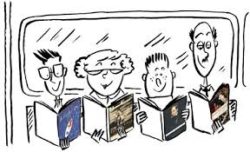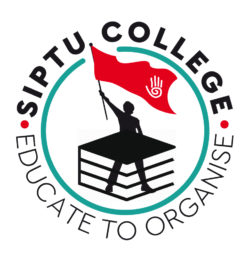 Welcome to Unit 1 of the Trade Unions & Collective Bargaining module. In this unit we will ask (and answer) the question: “What are trade unions?” We will look at union formation, structure, governance. What are unions for? What do we mean by ‘organising’ and ‘servicing’? Where does my union fit? What is business unionism? What is revolutionary unionism? Is there a middle path? What do we mean by ‘Sword of Justice’? As part of looking at union formation we will also look at union mergers and federations including ICTU (ETUC & ITUC ) and at, what are referred to as, global union federations. Chapter 3 of your textbook and your own union rule book are important for this unit.
Welcome to Unit 1 of the Trade Unions & Collective Bargaining module. In this unit we will ask (and answer) the question: “What are trade unions?” We will look at union formation, structure, governance. What are unions for? What do we mean by ‘organising’ and ‘servicing’? Where does my union fit? What is business unionism? What is revolutionary unionism? Is there a middle path? What do we mean by ‘Sword of Justice’? As part of looking at union formation we will also look at union mergers and federations including ICTU (ETUC & ITUC ) and at, what are referred to as, global union federations. Chapter 3 of your textbook and your own union rule book are important for this unit.
Have you ever come across Beatrice Webb? Beatrice was a sociologist, economist and researcher and along with her husband, Sidney Webb, and George Bernard Shaw, they established the London School of Economics and Political Science (LSE) in 1895. It was Beatrice who coined the phrase “collective bargaining” and co-wrote and researched some of the earliest theoretical and historical works on trade unionism. You can read more about her work at the link below:
https://www.lse.ac.uk/about-lse/lse-leading-women/biographies/beatrice-webb
but for our purposes we will focus on their definition of a trade union. According to them a trade union is
“… a continuous association of wage earners for the purpose of maintaining or improving the conditions of their working lives” (Webbs, 1920, p.1)
Does this match your definition of a trade union? Is this what your union is? The Webbs went on to describe the three main functions of trade unions, possibly not in words we would use today, as:
–“Mutual Insurance” (benefits)
–“Legal Enactment” (regulation)
–“Collective Bargaining” (negotiation)
Does this description cover everything your union does? Review your own union’s rule book and examine the purpose and functions outlined there.
In addition to these functions, and sometimes without explicit mention in a rule book, unions also cooperate with other unions both informally and formally. Some examples of informal solidarity might include Vita Cortex and the MANDATE Anti-apartheid strike in 1984. In the labour history module you may well hear about Irish/UK collaboration and solidarity around such issues as the “Kiddies Scheme” during the 1913 Lockout here in Ireland and the Miners’ Strike in the UK in 1984. You may know of other inter-union acts of solidarity in your own area.
There are also formal structures aimed at fostering national and international solidarity and bargaining. This is often achieved via federations of unions. Ireland has just one, the Irish Congress of Trade Unions (ICTU). Some countries have several, often segregated according to religion, politics or occupations. Internationally there is the European Trades Union Congress (ETUC) operating at EU level and the ITUC with a global brief. Global Union Federations are organised along industrial sectors such as ITF (Transport) IUF (food, hotel, restaurants); EI (education). They have their origins in the International Working Men’s Association (1864) and have reduced over the years from some 33 in 1914 to about 9 now. Their purpose and functions include:
–Networking, information sharing and lobbying international organisations
–International assistance for national unions in dispute
–Supporting boycotts; sympathy strikes; lobby national governments and other actors; name and shame companies and governments
–Supporting EWCs and ‘World works councils’ e.g. Ford, Phillips
–Promoting ILO codes, conventions and principles
–International framework agreements (IFAs)
Here’s a list of all of the global union federations:
- ITUC – Umbrella body
- BWI – Building Workers International
- EI – Education International
- IAEA – International Arts and Entertainment Alliance
- IFJ – International Federation of Journalists
- IndustriALL (IMF, ICEM, ITGLWF)
- ITF – International Transport Federation
- IUF – International Union of Food, Agricultural, Hotel, Restaurant, Catering, Tobacco and Allied Workers’ Associations
- PSI – Public Services International
- UNI – UNI Global Union (services & skills)
Is your union affiliated to one of these? Does your union or ICTU have a member on its Executive? How would you find out?

You can read more about Irish trade unions’ formation and functions, including the Irish Congress of Trade Unions, in Chapter 3 of your text book, Wallace et al. Wallace-et-al-Chapter-3
Here also is a short piece about Global Union Federations by Croucher & Cotton Croucher and Cotton, Excerpt 1

In this section you will find details about any publication mentioned above. Please note how this is done as you will need to follow this format in your own writing. In Return-to-Learn, this practice of citing and referencing correctly is explored further.
- Croucher, R., and Cotton, E., (2009) Global unions, global business: Global union federations and international business, London: Middlesex University Press.
- Wallace, J., Gunnigle, P., McMahon, G. and O’Sullivan, M. (2013) Industrial Relations in Ireland, Dublin: Gill and Macmillan
- Webb, S., and Webb, B., (1920) History of trade unionism, 2nd edition, London: Longman

SLIDES Lesson1
